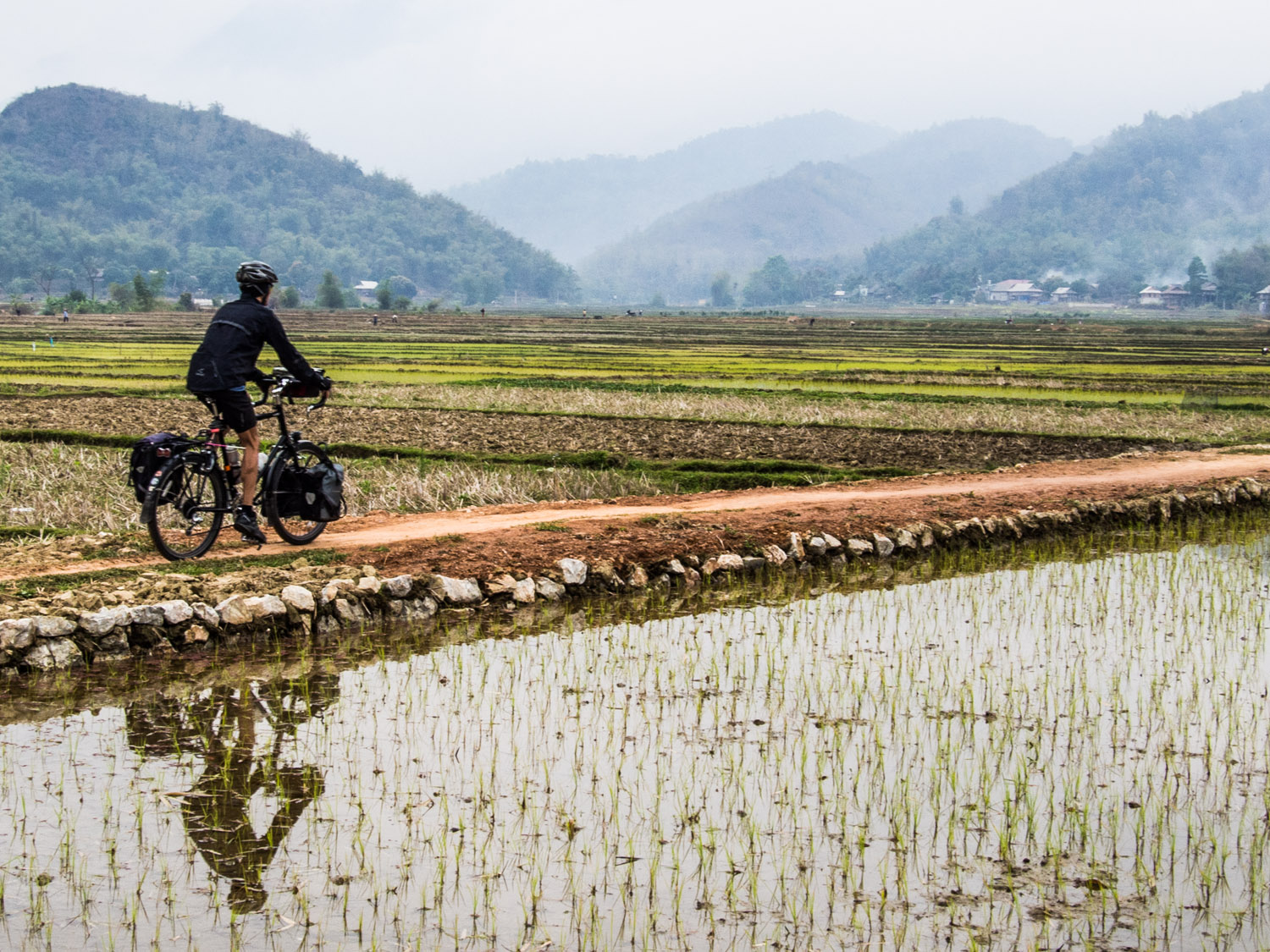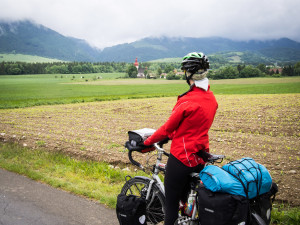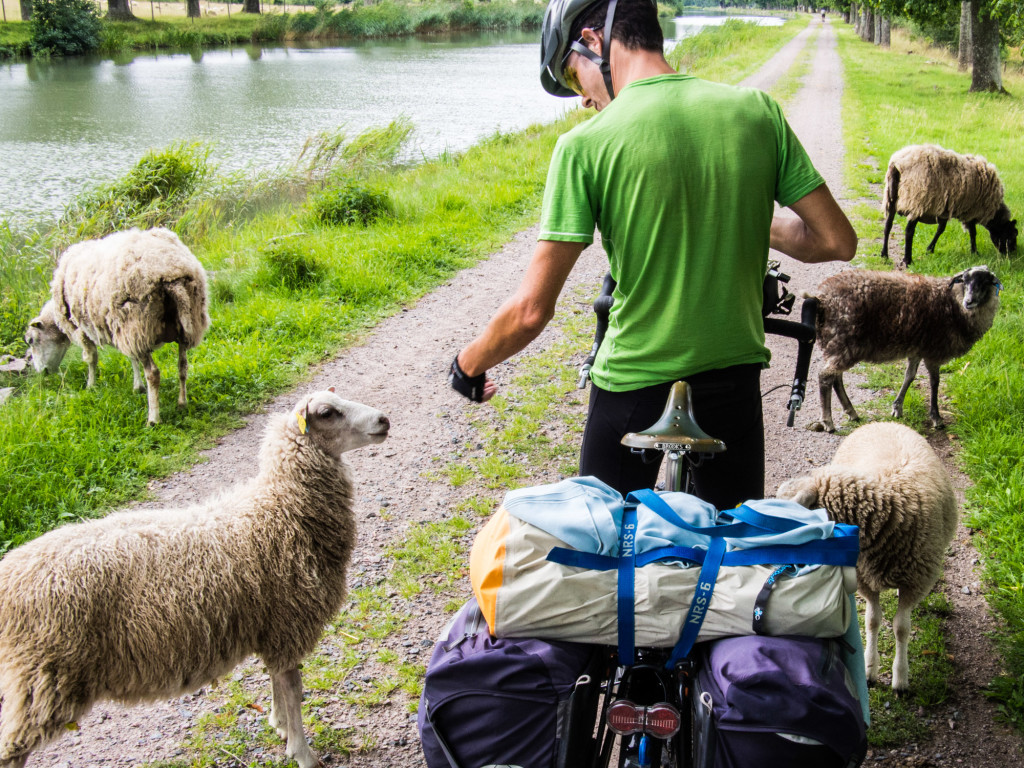
In 2012, travel blogger and adventurer Jane Mountain got laid off from her job. She seized this opportunity to take a career break and travel. However, the idea of flying from country to country or spending hours waiting at bus stations was totally unappealing to her. So she looked to another mode of transportation to get around.
“I found out about cycle touring by searching for eco-friendly ways to travel. My husband and I cycled through Eastern Europe, China and Southeast Asia for almost two years. It was an eye-opening experience because, since we had to travel so slowly and take country roads, we ended up visiting villages and parts of each country that tourists hardly ever see,” she says.
Not every day of those two years on a bike was easy.
“Of course, it was hard some days. On a bike, you are exposed to wind, rain and brutal heat. You have to climb mountains and ride on rough roads. But it was all worth it to be able to become part of the landscape and experience the world in such a unique way,” Mountain says.
Mountain is part of a growing travel trend: sustainable or eco-friendly travel. The two years she and her husband, Stephen, spent cycling wasn’t Mountain’s first taste of this trend.

In 2006, they were traveling the Middle East – it was a trip where they only used public transportation, stayed in locally-owned hotels and ate at local restaurants.
“Instead of hopping into taxis, we would walk through the city streets to our destinations. We were a group of six, so we could stop and chat with local people and explore un-touristy areas easily without interrupting the daily flow of life around us,” Mountain says.
It was this trip that really turned Mountain on to this way of traveling.
“We felt great about spending our money with locals instead of giving it to international corporations and we loved meeting the people who were directly benefiting from our travels. We also found that by travelling sustainably, we felt as if we really got to be immersed in the cultures we were visiting, instead of just seeing them from behind a pane of glass on a tour bus. It taught us that merely wandering through a city’s streets can be more rewarding than visiting the best museum or attraction in town,” she says.
What is sustainable travel?
For those who haven’t heard of it before or have never experienced it, their perception of sustainable travel may be a trip consisting of living modestly, eating a vegan diet and using eco-friendly toilet paper in outhouses. However, that’s largely not the case.
“Eco-tourism allows you to travel while minimizing the harm you do to the places you visit. It’s about being aware of where your money is going. It’s about asking questions before you mindlessly follow the tourist hordes or just do what everybody else is doing. Does an air tour over a National Wildlife Preserve pollute the environment? Does it hurt elephants when you ride on their backs? Can I get where I want to go without flying? It only takes a minute to look up the answers and you’ll often be shocked by the truth behind common tourist practices,” Mountain explains.
“As a whole, ecotourism and sustainable travel define the way of travel that has the power to preserve and improve the

environment, culture, economy and heritage of places, where both the consumer and marketers carry an equal responsibility,” says Vaivhav Todi, director of Greener Pastures, a sustainable travel company based in Northeast India.
Todi describes it as trying to travel responsibly and in a way that minimizes your impact on the environment, helps conservation efforts and promotes the local culture and economy, which is something he is personally invested in.
“Being born in this region [of India], ever since I was a kid I have been overwhelmed by the beautiful landscapes, wildlife and fascinating cultures that inhabit the region. Moving to the cities to complete my graduation made me realize that I was yearning for this easy and natural lifestyle I was used to. It also surprised me that a place as beautiful as Northeast India was seldom visited by travelers and people hardly knew about it,” he says. After graduating from school, he says it came naturally to him to return to his roots and do something positive for the region.
“I wanted the make the world aware about the splendor of Northeast India, I wanted the rich forests and cultures to survive. Being a travel enthusiast, the concepts of ecotourism and sustainable travel made a lot of sense to me. I realized that such methods were peculiarly effective for Northeast India where the natural and cultural elements were delicate enough to make travelers sensitive to preserving them,” he says of his motivation to start Greener Pastures.
Generally, sustainable travel is dependent on six factors:
- Modes of transportation: Rather than modes of transportation known for emissions that harm the environment, sustainable travel consists of walking, cycling, or using public transportation or hybrid vehicles.
- Dollars spent locally: This type of tourism ensures that locals benefit from your trip by spending money in community or locally-owned businesses, as well as working with tour operators and lodges that employ local people.
- Respect for local culture: When participating in sustainable tourism, you immerse yourself in and accept the difference of other cultures. You learn about their customs and social norms before you travel there. When possible, sustainable travelers speak the local language
- Offset and environmental policy: To travel sustainably, calculate and offset the carbon dioxide emitted by your travels. Also, buy your trip from companies that have policies in place that consider environmental, economic and socio-cultural impacts.
- Environmental conservation: You should choose a trip that strengthens conservation efforts for and enhances the natural integrity of the places your visit, including protected areas and wildlife habitats.
- Natural resource use: The three R’s – reduce, reuse and recycle. Also, consider the efficient use of water, energy, building materials and waste disposal methods.

“As an easy example, you should try to prefer hotels which employ and train locally, follow proper waste management and imply sustainability and renewable solutions in their architecture and daily operations. Or you can also prefer homestays that provide direct benefit to local economy and culture; chances are you will be intrigued by your host and end up learning more about a different culture, giving you a broader understanding of the world we live in,” Mountain suggests.
It isn’t just rustic – it can be luxurious too
A misperception about sustainable or eco-friendly travel is that it isn’t luxurious.
“Often, travelers think that they can’t experience luxury as an eco-tourist or that eco-tourism is all about trekking through the jungle, camping and living rough. But even luxury travelers have eco-friendly options available to them. It’s all about keeping your eyes open and spending a little time to make sure your travel isn’t destroying the places we love,” Mountain says.
Eco-tourism is being practiced by some of the most luxurious resorts and hotels around the world. Plus, eco-tours can offer you some of the most high-adrenaline thrills on the world travel market. Not only are these adventures fun, challenging and relaxing, they make you feel good about your trip afterward, too.
In fact, it was the combination of sustainability and luxury that lead Hans Pfister and his business partner Andrea Bonilla to launch Cayuga Sustainable Hospitality, a company that manages sustainable luxury hotels and resorts in Costa Rica and Nicaragua.
“We loved the idea of being able to do luxury hospitality and sustainability at the same time,” Pfister says. “We strive to redefine the concept of luxury and move away from marble bathrooms with golden fixtures. We believe that being in a remote and secluded destination with access to the creature comforts like high thread count linen, a very comfortable mattress, organic and locally-produced bathroom amenities and of course delicious, fresh locally produced food is very luxurious in itself. But the real luxury is created by the experiences that our guests have and the interactions with the local culture and people.”

Why sustainable travel is worth a try
If you’re interested in sustainable travel and eco-tourism, go for it!
“Aside from the obvious benefits of keeping the environment a little cleaner and benefiting the local people, sustainable travel is a way to make your travels more meaningful. Removing yourself from the corporate world of tourism and instead seeking out local, small businesses, you will discover so much more about the places you visit and about yourself when you travel. This kind of travel can be sustained because instead of taking away from places as you go, you are involved in an exchange, of cultures, ideas, and yes, money. Plus, it just feels good to be able to do a little good while you’re out on the road,” Mountain says.
Not only does sustainable travel benefit your health by making your environment healthier right now, but it makes an impact on the environment for the future.
“I firmly believe that a sustainable approach to modern lifestyle is an urgent need of the hour,” Todi says. “Numerous species of plants and animals are facing extinction throughout the planet, resources are dwindling as populations and demands grow, the seas are rising, the weather changing. Experts predict there will be an overwhelming 50 to 200 million ‘climate change refugees’ by 2050. This is where sustainable travel and ecotourism needs encouragement as tourism contributes an attractive 10 percent of the world’s GDP and we should try our best in making the industry more sustainable.”
Do your research first
But beware…not all sustainable travel is actually sustainable or eco-friendly.

Here’s how you can be sure your travels are sustainable:
“It is important for travelers to double check all the information he or she reads. A traveler can also simply call the service provider and have a chat about their responsible tourism initiatives – this helps you get an idea whether they are genuine. As far as I have observed, a genuine company is always passionate to discuss on environment and sustainable issues,” Todi says.
Don’t be afraid to ask questions.
“I am not a great fan of certification programs. I believe more in asking,” Pfister says. “Ask questions to the agency that is organizing the trip. Ask at the hotel about sustainable practices. Are supplies sourced locally? Is the staff from the local community, including managers? Ask to see the ‘back of the house.’ What detergents are used? How is the staff treated? Is there a waste reduction and recycling program? Do line staff employees understand the concept of sustainability? Are there conservation efforts in place?”

